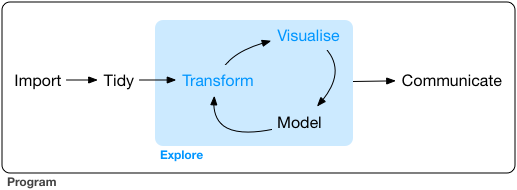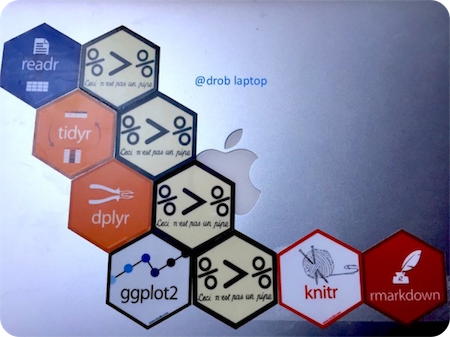Data processing with R tidyverse
Deprecated, new location at the University of Luxembourg
This website is deprecated.
The new repo is publicly available here with gitab
And the companion website is: https://rworkshop.uni.lu/
Introduction
R is a powerful language for data science in many disciplines of research with a steep learning curve. The tidyverse group of packages provide a dialect that greatly simplifies:
- data importing
- cleaning
- processing
- visualization as well as providing reproducible workflows using pipelines (
%>%)
Adopt Hadley Wickham, Chief Scientist at RStudio, philosophy: take each step of data science and replace many intricacies of R with clear, consistent and easy to learn syntax. RStudio will be the software to use since it eases package management, scripting, plotting and data handling.
The four day course provides a complete introduction to data science in R with the tidyverse. The course will not go deep into statistics but rather getting data ready, some exploratory analysis, visualization and handling models.
Preparing data takes up to 90% of the time spent in analysis — speeding this up is the mission of this course.
Tidyverse
The tidyverse is an official CRAN package and here is its manifesto. Hadley proposed the following workflow described in his must-read book R for data science

H. Wickham - R for data science, licence CC
In terms of R packages, the workflow is nicely depicted as in this picture, by David Robinson
Requirements
Prior knowledge
Participants should have basic experience in programming environments such as Matlab, Octave or other programming languages or complete a simple free online course as this one offered by DataCamp.
Material
Each student must bring their own laptop with R and Rstudio installed with recent versions. Please look at install tutorial to set it up prior to the course.
Schedule
Dates and time
From: 2nd May to 5th May 2017.
Each day, the workshop will be a mixture of lectures and practicals from:
- 9h30 - 12h30
- 13h30 - 18h
Coffee breaks will serve at each morning and afternoon sessions.
Program
- Day 1 will review the basics of
Rand loading data via thereadrpackage as well asRmarkdown. - Day 2 will introduce tidying and organising data via the
tidyranddplyrpackages as well asggplot2for visualisation. - Day 3 will look at functional programming tools using the
purrrpackage, which greatly simplifies repeating operations. Many statistical packages have complicated and idiosyncratic data structures. Thebroompackage helps to convert them to consistent data structures. - Participants are encouraged to bring their own data for analysis, convert existing code to tidyverse or perform a project on Day 4.
location
The course will be held at:
Maison du Savoir
University of Luxembourg
2 Avenue de l’Université
4365 Esch-sur-Alzette
Luxembourg
In the room 4.510, Maison du Savoir, 4th floor.

room 4.510
Registration
the course is limited to 25 participants. Register through this form
ECTS
PhD students that enrolled through the doctoral school will receive 2 ECTS in category 1, which requires handing in a short report (deadline 19th May 2017).
Elixir
This event is supported by ELIXIR-Luxembourg

